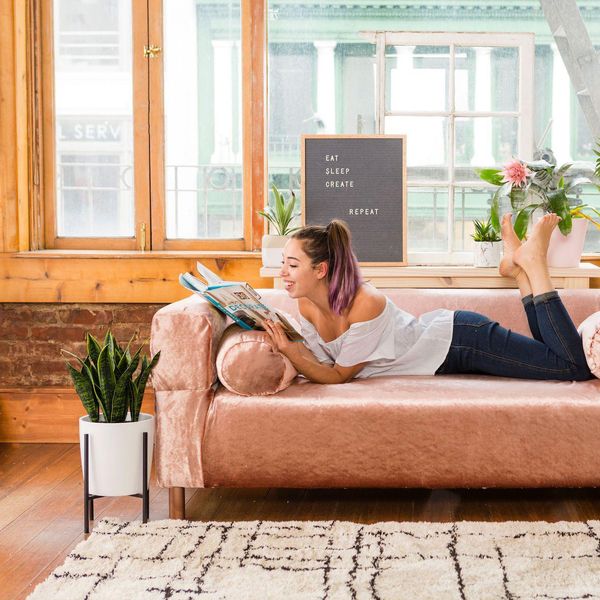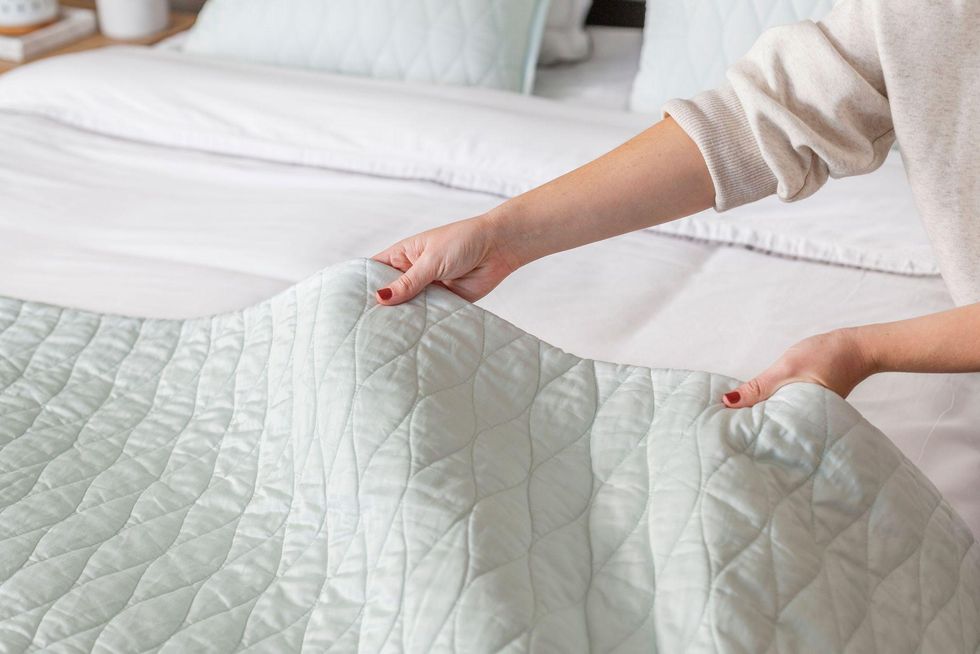
If you're struggling to get out of bed in the morning, it can feel hard to tackle the day with an energetic mindset and upbeat attitude. I personally have struggled with insomnia my entire life, and it's occurred to me multiple times that my body simply wasn't built for the society we live in. But if you're still clueless as to how to become a morning person (like I was), creating a routine can help coax your body into a rhythm so you wake up more refreshed and ready for the day ahead. Here are the seven steps I took to improve my sleep, reduce my insomnia, and become more of a morning person.
Go To Bed Earlier
It sounds obvious, but going to bed earlier can have serious implications on your energy levels in the morning. I used to go to bed around 10 p.m., but due to my insomnia, it would often be 12 or 1 a.m. before I actually fell asleep, all before waking up at 6. Do the math on how many hours of sleep that is per night! (Hint: Not enough.)
In addition to implementing some good nighttime routine practices (we'll get there in a moment), I decided that due to my long window between going to bed and falling asleep, I should really be hitting the hay around 9 p.m. Even if you don't suffer from insomnia, it may be that you need more sleep than the average person. Studies have found that some people simply need more sleep than others.
Sleep In Darkness and Silence
Another thing that really helps a lot of people is tweaking your sleeping environment so you can sleep in complete darkness and silence. Blackout curtains are a must if you live on a street that stays lit into the night, and it goes without saying that small lights from phone chargers or electronics should be moved into other rooms.
Getting total silence is another story. Many of us don't have the option, but if you have a finished basement in your home, it might be worth moving your bedroom downstairs so you can sleep in an area protected from noise pollution. If not, a white noise machine can help cover up loud or sudden noises so your sleep isn't disturbed at night.
In addition to curating the perfect environment for sleep, making your ideal bedding situation as cozy as possible will really help you relax. Get ready to crawl into your most comfortable nest, hot tea in hand.

Consider Your Lifestyle And Chronotype
Considering your lifestyle as well as your body's natural preferences can be crucial for setting a healthy sleep-wake schedule. If you work out after work, for example, you may want to set a later bedtime and later wake time, because exercise can trigger energy-boosting hormones that make it harder to fall asleep for about 90 minutes after activity. Do you work early in the morning? Adjust your bedtime accordingly.
One important factor in your ideal sleep-wake schedule is your chronotype. A chronotype is essentially an MBTI type for your sleep patterns; there are four basic chronotypes, and each has a different biological preference when it comes to sleep.
- Lion: These people are early birds, and they probably aren't reading this article because they're already morning people!
- Bear: Most people fall into this category. These individuals' sleep-wake preferences are generally aligned with the sun. They wake up relatively easily in the morning (provided they have good sleep hygiene) and start to tire around 8 p.m.
- Wolf: If you absolutely loathe mornings and find yourself energetic long into the night hours, you may be a wolf chronotype. These people are classic night owls.
- Dolphin: This is my personal chronotype. Dolphins are anxious sleepers, often remaining awake long after getting into bed, and sleeping lightly throughout the night.
Wake Up With What You Need
Now let's get to the fun part: Creating your actual routine. Half of becoming a morning person is, naturally, your morning routine. Give yourself a head start by waking up with whatever you need right next to you (or at least prepped nearby). Here are some examples:
- If your plan is to work out in the morning, have your gym clothes folded on your nightstand.
- Before going to bed at night, heat some water and pour it into a Hydro Flask, along with a few drops of lemon. Place it on your nightstand... it'll still be warm when you wake, making the healthy habit of drinking a morning lemon water incredibly easy.
- Get a coffee maker with a timer so your coffee is already brewed when you wake up.
- Wintertime chills got you cuddling in bed long after you should've gotten up? Keep your robe and slippers right next to your bed so they're ready to slip on as soon as you wake.

Create A Routine You Actually Like
This tip is super simple: Don't overcomplicate your mornings! People on social media tend to have aspirational morning routine ideas, but if journaling for 20 minutes isn't your idea of a good time, don't do it. Here are some easy and enjoyable activities you might want to add to your morning routine:
- Eat a delicious breakfast (and it doesn't have to be a complex one! Nostalgic breakfast cereals are totally OK).
- Read your favorite magazine or website.
- Pull a tarot card.
- Light a scented candle or some incense.
- Listen to music.
- Have fun playing with makeup and creating your look for the day.
- Cuddle with your pet (just don't do it in bed, or you might never want to get up!).
Try Light Therapy
Another way to help yourself wake up in the morning, especially if you're really struggling, is to try light therapy. The New York Times described just how big a role light plays in our circadian rhythms. If you're trying to reprogram your own sleep-wake cycle, using a light therapy machine when you wake up can help communicate to your body that it's time to be awake. If you live in a climate where it's appropriate, natural light works too:
“That means eating breakfast in a sunny place, opening the shades in the bedroom or getting outside” soon after waking, Dr. Jodi Mindell, Ph.D., professor of psychology at Saint Joseph’s University and associate director of the Sleep Center at the Children’s Hospital of Philadelphia, told the Times. “It’s using that morning light time to keep their clock on track and not shift later.”
Stay Consistent On Weekends
Finally, don't let all the hard work you do throughout the week go to waste when the weekend comes along. The Monday through Friday, 9-to-5 schedule, while still not totally ubiquitous, is a fairly recent invention and doesn't mirror the cycles our bodies were designed for. Your body doesn't recognize Saturday as any different from Monday!
So while it can be tempting to let yourself sleep in on the weekends, keep up your new routine every day. Over time, it will grow to be so natural that you simply wake up around the same time each day, without even having to try.
As you begin to discover how to become a morning person, share your experience with us! Tweet us @BritandCo, and make sure to sign up for our newsletter.
Brit + Co may use affiliate links, but always provides genuine editorial recommendations.
This article has been updated.
